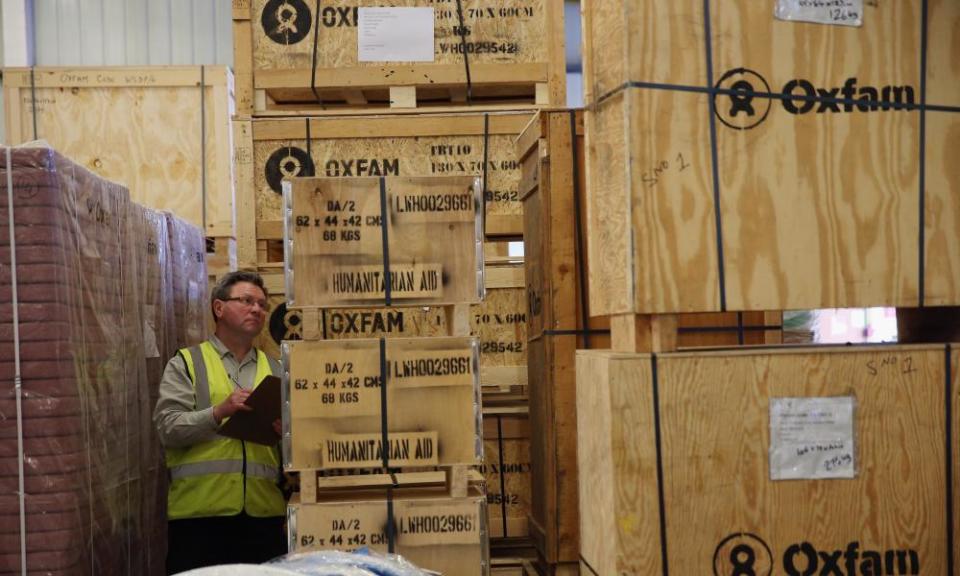I’m going to keep giving to Oxfam, and so should you

If there is one clear thing we have learned from the revelations about the behaviour of certain Oxfam staff in the aftermath of the 2010 earthquake in Haiti and in Chad in 2006, it is how much our standards and expectations have changed over the intervening years. The idea of a sex scandal has largely been stripped of the titillating ring it once had. The story has mostly centred on the abuse of women by men who had power over them. Prostitution has been treated as an unquestionable wrong, and it is now widely accepted that being paid for sex is something women can find themselves forced into, not just by the men who are paying but also by their economic and social vulnerability.
Cast your mind back: 2011 was the year in which the BBC shelved a Newsnight documentary about the Jimmy Savile scandal. It would be a further 11 months before ITV’s Exposure: the Other Side of Jimmy Savile lifted the lid on what had been an open secret for a long time. Operation Yewtree would not get under way until 2012. Gary Glitter, Rolf Harris, Stuart Hall and Max Clifford had not yet been charged. When that finally happened there was widespread disbelief that so many beloved celebrities could have done these things and an equally widespread belief that these were old men being dragged into court for behaviour that was once merely roguish.
The country was about to start a long, slow and painful process, the latest chapter of which was the prosecution of the junior football coach Barry Bennell. A process that continues, I earnestly hope, until there are fundamental and lasting changes made in every workplace and organisation. Finally, we are beginning to accept that sexual abuse is endemic and that anyone naive enough to think that their organisation is immune needs to look longer and harder, to investigate proactively, to encourage victims and witnesses to speak up, and to protect them when they do.
Many institutions are still desperately trying to work out how to do these things. Others have woken up to their responsibilities only in the past year or so after a series of scandals forced their hand, including in sport, parliament and the fashion industry. Paradoxically – and partly in response to certain men’s shameful actions and the charity’s inadequate response in Haiti and Chad – Oxfam started this necessary and difficult work before most. It employed a head of safeguarding, set up a hotline for whistleblowers, sent safeguarding teams to overseas programmes, and began publishing a list of all safeguarding incidents. Indeed, some of the supposed revelations over the past few weeks were detailed in a letter sent to Oxfam donors last year.
If you want to stop donating to the charity, make sure your money still gets to the people who need it
My wife, Sos, and I have been Oxfam donors for decades. We admire the work it does in crisis response, development and campaigning. We admire its willingness to examine its practices and change accordingly. We admire how financially efficient it is. And in particular we admire how in recent years it has moved towards employing local people and charities to carry out development projects that can be replicated and sustained entirely by the communities themselves.
I have visited a number of Oxfam-funded projects in the UK, Ethiopia and Jordan, and everywhere I have been I’ve seen women’s lives improved by better access to work, to an independent income, to education, housing and healthcare. We know people who work for Oxfam and, perhaps more significantly, we know those who used to work there, and have no reason to speak other than candidly about the charity.
We will keep supporting Oxfam and donating money because the vast majority of the people it employs are deeply honourable people who do vital work, and because it is making a huge effort to stamp out abuse (you can read its action plan here ). But most important of all, we will keep supporting Oxfam and donating money because of the millions of people throughout the world who depend on that vital work.
It is these people who seem to have been left out of the conversation in the past couple of weeks: people in Yemen who, after three years of war, are now facing the world’s largest cholera outbreak; more than half a million Rohingya people fleeing to Bangladesh to escape the violence in Myanmar; 3.8 million people driven from their homes in the Democratic Republic of the Congo; recipients of Oxfam aid and support in Bolivia, Malawi, Kenya, the Philippines, Niger, Rwanda, South Sudan and Zimbabwe.
I am sad and angry about what happened in Haiti and Chad, but I am also sad and angry that people in the UK who had no interest whatsoever in the welfare of those people are now occupying the moral high ground or, worse, using this crisis as a way of furthering their own campaign against overseas aid in general.
Taking money away from Oxfam is not an act without consequences. If you want to stop donating to the charity, make sure your money still gets to the people who need it. And whichever charity you choose, ask what they are doing to root out and prevent abuse. Because it will be happening and it will come to light. It has to come to light.
The only route out of this terrible mess is for every charity – for every organisation of any kind – to turn a harsh light on itself, to accept its failings and to change them. It will be a painful journey, but it is one they are all going to have to take. And the sooner they start, the better.
• Mark Haddon is a novelist and poet

 Yahoo News
Yahoo News 